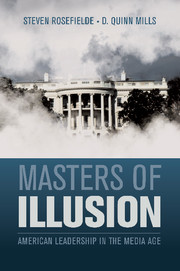Book contents
- Frontmatter
- Contents
- List of Tables and Figures
- Preface
- Acronyms
- Executive Summary
- Acknowledgments
- PART I NATIONAL SECURITY IN THE NEW AGE
- PART II AMERICAN PUBLIC CULTURE AND THE WORLD
- PART III AMERICAN PUBLIC CULTURE AND OURSELVES
- 6 Champions of Freedom or Imperialists: How We're Perceived
- 7 We're Different Now
- PART IV THE RECONFIGURATION OF NATIONAL WEALTH AND POWER
- PART V VORTEXES OF DANGER
- PART VI THE AMERICAN RESPONSE
- PART VII LEADING TOWARD PEACE
- PART VIII AMERICAN PRESIDENTIAL LEADERSHIP
- Notes
- Glossary
- Bibliography
- Index
6 - Champions of Freedom or Imperialists: How We're Perceived
Published online by Cambridge University Press: 31 July 2009
- Frontmatter
- Contents
- List of Tables and Figures
- Preface
- Acronyms
- Executive Summary
- Acknowledgments
- PART I NATIONAL SECURITY IN THE NEW AGE
- PART II AMERICAN PUBLIC CULTURE AND THE WORLD
- PART III AMERICAN PUBLIC CULTURE AND OURSELVES
- 6 Champions of Freedom or Imperialists: How We're Perceived
- 7 We're Different Now
- PART IV THE RECONFIGURATION OF NATIONAL WEALTH AND POWER
- PART V VORTEXES OF DANGER
- PART VI THE AMERICAN RESPONSE
- PART VII LEADING TOWARD PEACE
- PART VIII AMERICAN PRESIDENTIAL LEADERSHIP
- Notes
- Glossary
- Bibliography
- Index
Summary
Americans see big differences among ourselves; some of us are conservatives, some liberals; some are Republicans, some Democrats. Some are moderates, a few are radicals (of either the left or the right). Looked at from abroad, except among a few people who make it their business to be very familiar with our politics, these distinctions are very hard to perceive. Americans seem a lot alike. There seems little difference among the political parties, and less among the candidates they offer for president. Many, perhaps most, Europeans, for example, were stunned during the 2004 presidential campaign debates when both candidates (Kerry and Bush) endorsed military preemption against threats from abroad. What stand out to others are the things we have in common; and the most evident of these is our public culture – its optimism and its illusions.
HOW WE AND OTHERS SEE US
A most important element of our public culture is our view of ourselves. It's shaped by the same forces (wishful thinking, partisan politics, and media commercialism) as are other elements of our public culture, and it is reflected in misapprehensions and misinformation as well. Our politicians and our media tell us what we want to hear about ourselves. But our self-image is more complex and self-contradictory than other parts of our public culture. This is most easily seen when we contrast our self-image with the perception of America abroad.
- Type
- Chapter
- Information
- Masters of IllusionAmerican Leadership in the Media Age, pp. 103 - 116Publisher: Cambridge University PressPrint publication year: 2006



